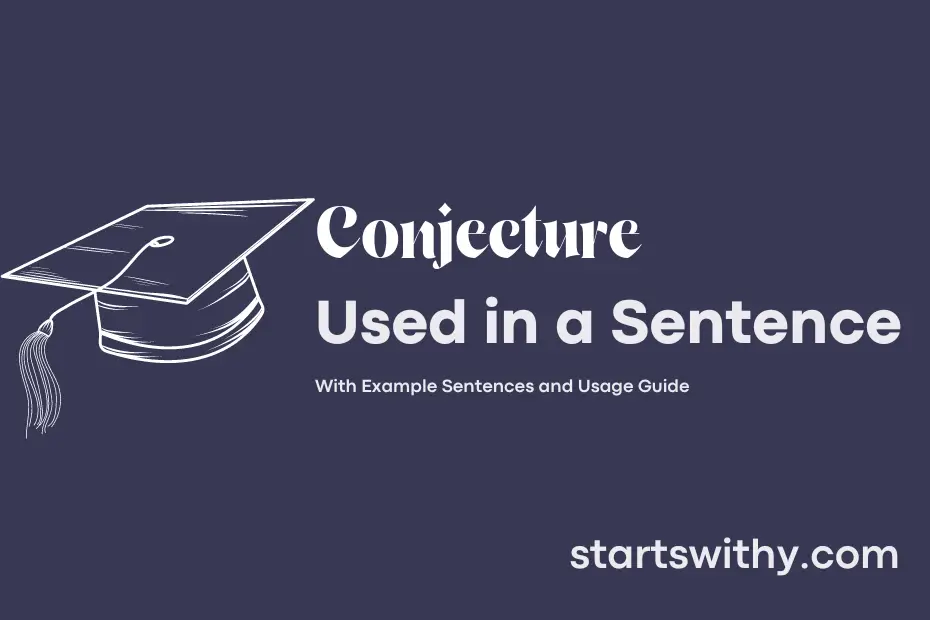Have you ever wondered about a statement or theory that lacks concrete evidence? This is where conjecture comes into play.
Conjecture is a hypothesis or inference based on incomplete information or guesswork. It involves making educated guesses or speculations about a particular topic without solid proof.
7 Examples Of Conjecture Used In a Sentence For Kids
- Conjecture means to guess something.
- We can make a conjecture about what will happen next.
- Let’s use conjecture to solve the puzzle.
- A conjecture is like making a smart guess.
- When we conjecture, we think about possibilities.
- We can use conjecture to think about what might happen.
- Conjecture helps us make predictions.
14 Sentences with Conjecture Examples
- Conjecture plays a significant role in academic debates among college students.
- During discussions in philosophy class, students often engage in conjecture about various ethical dilemmas.
- In literature studies, students are encouraged to explore different conjectures about the author’s intentions.
- Conjecture often leads to innovative research ideas and perspectives in social science courses.
- Students in mathematics classes are routinely challenged to prove or disprove conjectures.
- Conjecture is a common theme in scientific research discussions among college students.
- During group projects, students may need to collaborate on forming and testing conjectures.
- In psychology studies, students analyze conjectures about human behavior and cognition.
- Conjecture can spark insightful discussions in political science classes.
- College students frequently engage in conjecture about historical events and their implications.
- In business courses, students may need to develop conjectures about market trends and consumer behavior.
- Conjecture is an essential skill that helps students think critically and analytically.
- Professors often encourage students to challenge existing conjectures in their fields of study.
- Through debates and presentations, students can showcase their ability to defend their conjectures effectively.
How To Use Conjecture in Sentences?
To use the word Conjecture in a sentence, follow these easy steps:
-
Understand the meaning of Conjecture: A conjecture is a conclusion or opinion based on incomplete information. It is an educated guess or supposition made without sufficient evidence.
-
Identify the context: Think about a situation where you need to make an assumption or guess about something based on the information at hand.
-
Frame a sentence: Start by introducing the context or background information that leads to the conjecture. For example, “Based on the weather forecast and the dark clouds outside, I conjecture that it will rain today.”
-
Use the word Conjecture appropriately in your sentence: Place the word Conjecture where it fits naturally within the sentence structure. Avoid forcing the word in; instead, let it flow smoothly in your sentence.
-
Check for understanding: Ensure that the sentence accurately conveys your intended meaning and that the Conjecture aligns with the context provided.
-
Practice makes perfect: Keep practicing using Conjecture in different sentences to become more comfortable with incorporating it into your everyday language.
Remember, Conjecture is a useful word for expressing theories, predictions, or assumptions in a thoughtful and analytical manner. Have fun experimenting with this word in your writing and conversations!
Conclusion
In conclusion, sentences with conjecture involve statements based on incomplete information, logical deductions, or educated guesses. These sentences often contain words like “may,” “could,” or “might,” indicating uncertainty or speculation. While conjecture can be useful in making predictions or forming hypotheses, it is crucial to note that these sentences lack concrete evidence and should be viewed with caution.
By recognizing sentences with conjecture, individuals can better understand when information is based on assumptions rather than facts. Acknowledging conjectural language can help improve critical thinking skills by prompting individuals to question the validity of statements and seek supporting evidence. As a result, being mindful of sentences with conjecture can lead to more informed decision-making and a deeper understanding of the basis of various claims.



